Building Educational Capacities for STEM Success
The IERC has completed a groundbreaking seven-year initiative (2017-2024) that has fundamentally transformed mathematics and science education outcomes for Indigenous and non-Indigenous students across North Queensland schools. Under the leadership of Professor Martin Nakata, our team — through the ARC Centre of Excellence for Australian Biodiversity and Heritage — developed a comprehensive strategy that moved beyond traditional STEM initiatives. Rather than focusing on short-term engagement or aspiration-building activities, we addressed the core educational capacities needed to improve foundational mathematics and science performance.
Scroll down to Our Distinctive Approach to read the success of our project's results, methodology, key findings and implications.
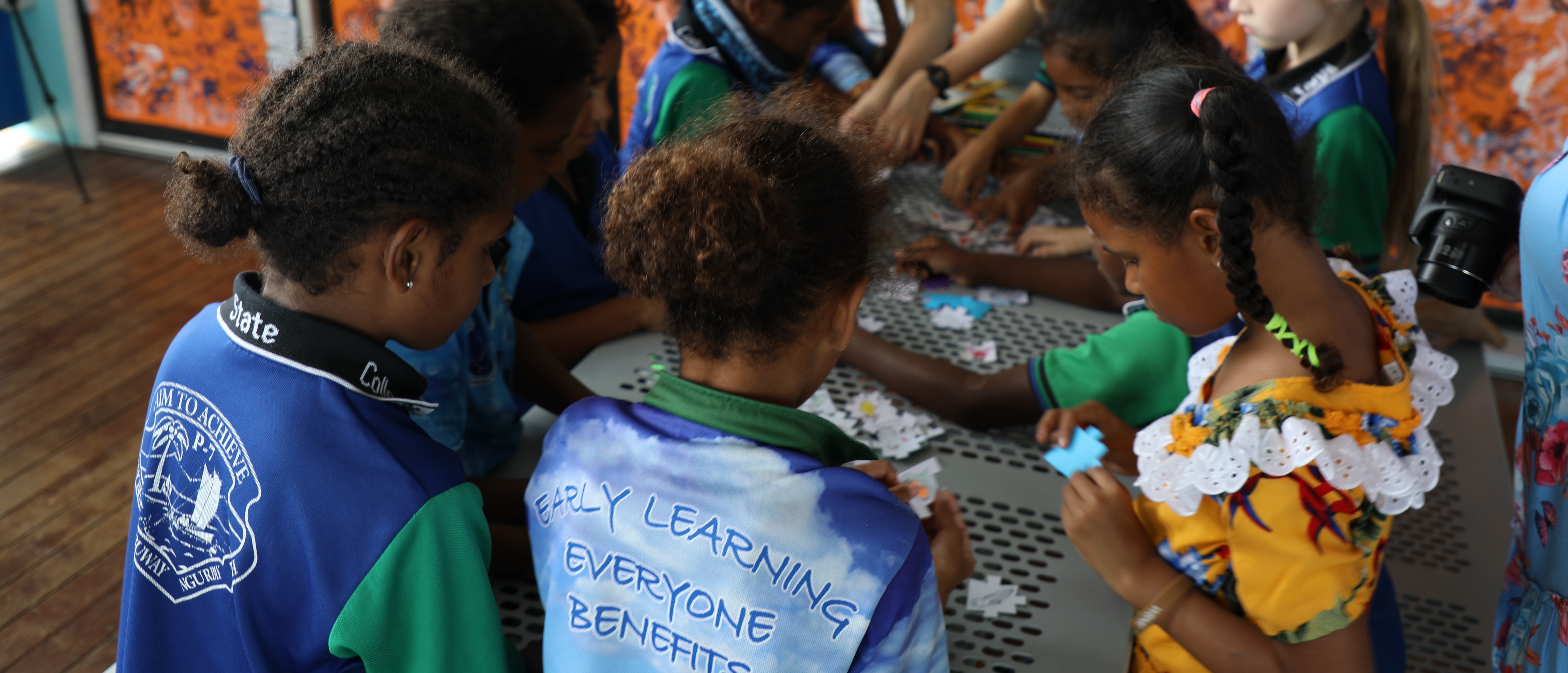
The Major Challenge
Aboriginal and Torres Strait Islander students constitute a very small cohort of students who go on to participate in STEM disciplines in university settings. The challenges in increasingly higher numbers of students in university-level studies have been the level of achievements in the school system in core disciplines like Math and Science.
According to federal government sources, Aboriginal and Torres Strait Islander students performance in STEM education has been languishing for some years. For example, 68% of Aboriginal and Torres Strait Islander students were below the international standard in year 8. This compared to an average of 34% of non-Aboriginal and Torres Strait Islander students being below the international standard in year 8. These gaps in STEM education have not changed in the past 20 years.
Our STEM work at the Indigenous Education and Research Centre is to help surmount these challenges.
Our Project
The Prep-Year 12 Indigenous STEM Project is the result of a partnership between Tagai State College, Yarrabah State School, Bentley Park College, the ARC Centre for Australian Biodiversity and Heritage and JCU.
This partnership project aimed to improve the academic performance of Indigenous students in the STEM areas of the school curriculum. This project involved aligning the assessment and curriculum processes to the Australian Curriculum Achievement Standards and devising learning engagements in increments to build the necessary capabilities and capacities students require to succeed in their studies. It is a unique approach to improve the agenda in STEM education.
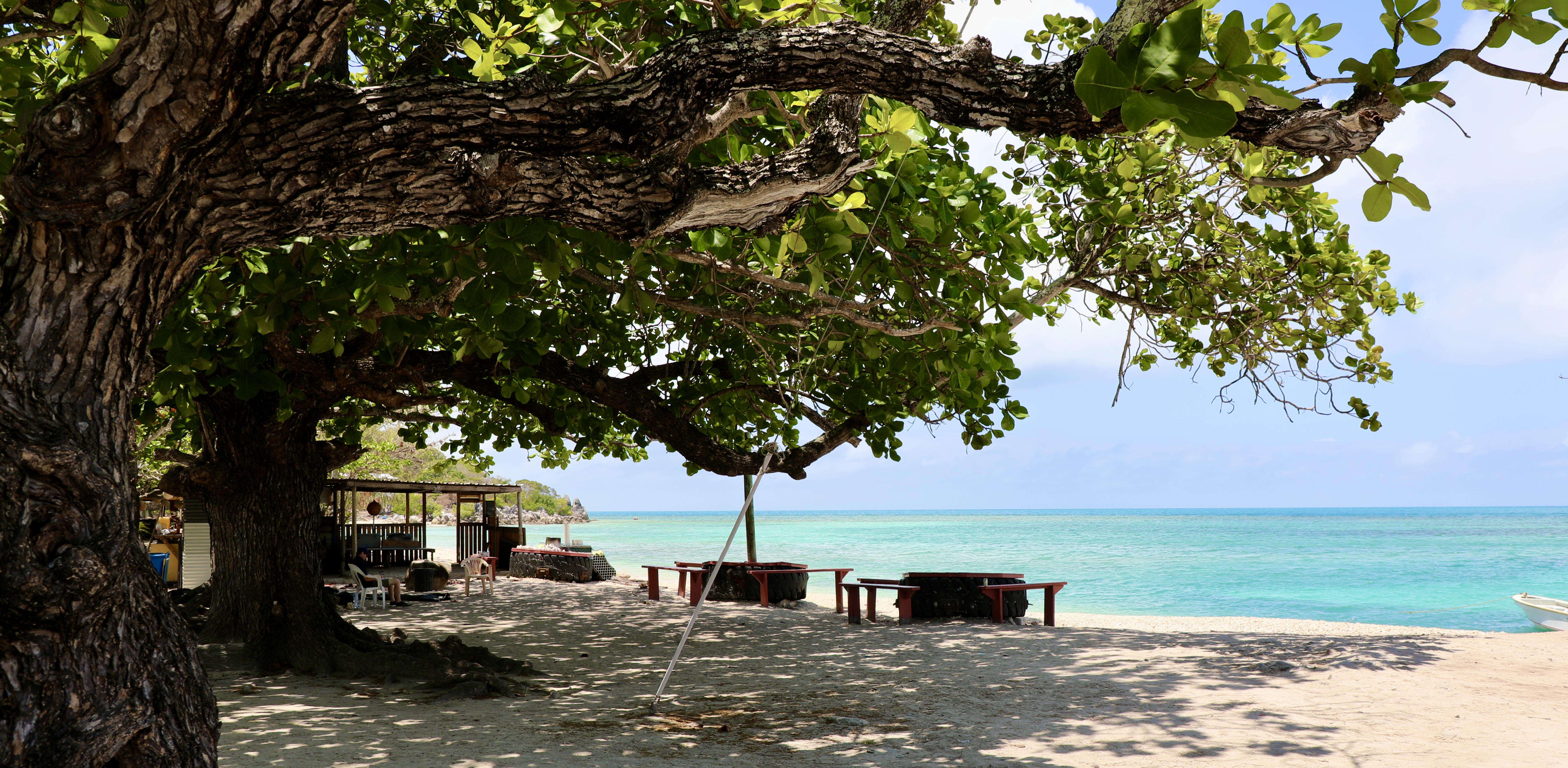
Our missions include:
- To achieve a process that will ensure all students gain the required levels of skills and knowledge to participate successfully in the curriculum.
- To contribute lessons on improvements in STEM education that can benefit our national challenge to Indigenous schooling outcomes.
- To improve learning capabilities to ensure all students have an equal opportunity to get an Australian Tertiary Admission Rank (ATAR) for entry into university STEM areas.
The project consisted of developing end of term assessments in line with Australian Curriculum standards. This was achieved by a rigorous process of auditing, mapping, designing and evaluating each assessment task across the Science, Technology, Engineering and Mathematics subjects right through from Prep to Year 12.
Ultimately, the project had two key components – the educational aspect and engagement to showcase the work being done to parents, teachers and the community.
Auditing
- Analysis and understanding of the Australian Curriculum (AC) achievement standards
- Investigation into what materials currently exist and what is currently being using in schools
- Determine whether all AC achievement standards are being met and to what level
Mapping
- Map the achievement standards endpoint and work back to ensure all learning requirements are met at each level to meet the standards
- Determine whether the achievement standards line up each year and if there were any gaps in the learning materials
- Assess if the incremental steps within each achievement standard throughout the year were aligned
- Check that the AC standards at the end of Year 12 were aligned to first year university studies
Assessment design
- The knowledge gained from the rigorous auditing and mapping process was then used to design of summative and formative assessments for each term
- The assessment activities were adapted to build knowledge and skills using local to global knowledge frameworks using content that was familiar and appropriate to students
Evaluating Results
- The final step in the process was to evaluate the student results data, pre and post the implementation of the project
What influenced the contents of the summative assessments?
- The outcomes of the audit
- The trial of materials across Tagai State College, Yarrabah State School, Bentley Park College and feedback from teachers
- The Torres Strait complexities (i.e., remoteness, limited outside exposure, English as a second language or dialect, etc.)
- Research from the broader literature
- A desire to create independent learners
What’s different about the new assessments?
- The language of the questions was completely stripped back (i.e., a mathematics assessment is now tested on mathematics skills, not literacy)
- Use of local context and educational hooks
- Oral and activity based questions for Prep to Year 3
- Longer tasks in both mathematics and science to aid long term embedding of knowledge
Over the past few years, the Project has included engagement activities in the Torres Strait Islands and greater Cairns region.
The STEM Roadshow travels to the primary and secondary schools on Thursday Island in an attempt to engage students in a variety of fun and educational science experiments. The learning concepts from these experiments led straight back to the classroom and were linked to the Australian Curriculum achievement standards.
The Traditional Astronomical Knowledges Evening encouraged the sharing of knowledge from the Elders down the generations on how Islanders base their lives off the sky. From fishing and gardening to their artwork, they look to the skies for answers.
Parent Program
We understand the difficulty some parents have assisting their children with homework and keeping them engaged in learning. This program was designed for parents and community members to help engage their children in the STEM areas when they get home from school.
The information shared at the Parent Program provided tips on how to further encourage children to talk about what they’ve learnt at school. Parents do not have to be teachers or scientists to help their children, but encouraging continued interest and engagement was key. In fact, this program encouraged ways to let children be the ‘teachers’ at home.
Teacher Conferences
All Teacher Conference
Tagai State College coordinated a biennial All Teacher Conference where all teachers within the College travel to Thursday Island. In 2019 the STEM Project team were invited to present on a general overview of the project, the gap between secondary and tertiary education for Indigenous students, and a secondary school mathematics session that was focused on how to mark assessments and use graphics calculators.
Indigenous Teacher Conference
The College also organised a two-day Indigenous Teacher Conference for all Indigenous teachers and teacher aids on Thursday Island. The Project team attended this conference in 2019, with Chief Investigator, Professor Nakata presenting a keynote address.
Leaders Conference
All three partner schools have regular Leader conferences, including the Heads of Campus, Heads of Departments and Executive Team. The Project team was invited to present at some of these events, and were in attendance at others to answer any questions or queries and participate as required. Professional development was also provided where needed with leaders and teaching staff.
Commencing in 2017, the STEM Project was a partnership between the Australian Research Council's Centre of Excellence for Australian Biodiversity and Heritage (CABAH), the Indigenous Education and Research Centre at James Cook University and Tagai State College. The project later expanded to include Yarrabah State School and Bentley Park College, with collaborative work beginning in semester 2, 2022, primarily focusing on mathematics and science curriculum development with school leaders and curriculum heads. The refined and redesigned assessment tasks developed through this collaboration were successfully rolled out across these partner schools in 2023.
Torres Strait Islanders who live and work in the remote Torres Strait are invested in the sustainability of their natural environments, which have provided for their needs over millennia. Environmental and species management and regional infrastructure solutions are important sources of future employment and of interest to many Islanders. Although Islanders have their traditional knowledge to draw on, STEM education is essential if Torres Strait Islanders are to gain the qualification to participate in employment and decision-making in these areas.
The STEM Project began as a collaborative project to improve the capacity of Torres Strait schools to deliver parity student outcomes in the Science, Technology, Engineering and Mathematics (STEM) disciplines. This challenge extended beyond the Torres Strait to other Indigenous communities in North Queensland. Bentley Park College, located on the outskirts of Cairns, serves approximately 2,000 students from Prep to Year 12, with 40% Indigenous enrollment and a very high English as a second language background, drawing from fairly low socioeconomic communities. Similarly, Yarrabah State School, situated in an Aboriginal community south of Cairns, educates about 450 Indigenous students from Prep to Year 10, with all students being Indigenous. Like Tagai State College students, these students have English as their 2nd or 3rd language and are significantly disadvantaged by the English-based curricula and the pace of the curricula delivery.
Under these conditions, it is difficult to improve student progress through the STEM curricula from Prep to Year 12. The outcome is that after 13 years of schooling, few students from the remote Torres Strait region have the necessary requisites for entry into university courses in the STEM areas, despite having aspirations to careers in those areas.
Tagai State College reached out to the IERC at JCU for assistance that would ensure their students developed the confidence and capability they need to succeed in the STEM areas from year to year.
The IERC team combined their knowledge, experience and passion for providing real opportunities to Indigenous students and applying this to assist remote Torres Strait Islander students. They contributed to the project by reviewing, designing and implementing appropriate assessment tasks within the STEM subjects at Tagai State College (and later Bentley Park College and Yarrabah State School) so that they meet the relevant Australian Curriculum standards for progression through the Prep to Year 12 years. The team consisted of maths and science experts and includes Torres Strait Islanders with experience of education in the Torres Strait.
This seven-year project was dedicated to ensuring all students have the same opportunities to undertake tertiary studies as other Australian students.
Our Distinctive Approach
While most STEM initiatives focus on short-term engagement or aspirational activities, we took a radically different path. We recognised that lasting improvement required addressing the core educational capacities that underpin mathematical and scientific understanding.
This wasn't about making STEM subjects more "interesting" or "culturally relevant" through one-off activities. Instead, we focused on systematically building the foundational knowledge and skills that enable students to achieve genuine mastery of complex concepts.
Our work spanned three diverse educational settings:
- The remote island communities served by Tagai State College
- The regional Indigenous community of Yarrabah State School
- The urban setting of Bentley Park College in Cairns
Together, these partnerships encompassed 19 campuses, 2,600 Indigenous students, and 1,500 non-Indigenous students, providing a robust test of our approach across dramatically different contexts.
Our Methodology
Our evidence-based methodology represents a paradigm shift in STEM education for Indigenous students:
The project undertook a comprehensive analysis of over 450 achievement standards and 550 content descriptors across the mathematics and science curriculum. This process identified critical gaps in curriculum sequencing that had historically impeded student progress. Based on these insights, the team developed more accurate prerequisite learning pathways for key mathematics and science concepts.
A systematic review and refinement of more than 5,000 assessment questions was conducted to align assessment tasks with curriculum standards. Nuanced marking guides were developed, comprising approximately 2,700 lines and 13,500 individual entries. A three-tier complexity framework was implemented to provide detailed insights into student capabilities and levels of conceptual understanding.
A comprehensive digital analytics system was deployed to track student achievement against specific curriculum elements. The platform supported electronic marking of assessments and enabled detailed tracking of individual student progress. Class-level and cohort-level analytics provided teachers with unprecedented insight into learning trajectories and instructional effectiveness.
The project employed random forest algorithms to uncover hidden relationships within educational data. This approach enabled the identification of prerequisite skills most predictive of student success in mathematical concepts. These findings challenged assumptions embedded in curriculum documents and teaching practice, informing a more evidence-based approach to curriculum implementation.
Key Insights from Our Partnership Project
Our seven-year investigation yielded revelations that challenge conventional approaches to mathematics and science education:
- Focus on Fundamentals: Our project demonstrated that focusing on foundational skills and content sequencing can yield more substantial and sustained improvements than approaches emphasising cultural relevance or engagement strategies alone.
- Achievement Drives Engagement: Our data suggests that the relationship between engagement and achievement may be more complex than often assumed. Rather than treating engagement as a prerequisite for learning, our findings indicate that experiencing academic success can drive increased engagement and attendance.
- Curriculum Sequencing is Critical: Our analysis revealed discrepancies between official curriculum progressions and empirically derived learning pathways. Current curriculum frameworks may inadvertently create barriers to student progress by failing to accurately reflect how mathematical understanding develops.
- Cross-Disciplinary Benefits: Students who showed gains in mathematics and science also demonstrated enhanced achievement in English, creating positive effects across the curriculum. This supports research showing links between mathematics proficiency and literacy development.
- Sustainable Improvement: Unlike the ephemeral gains often associated with educational interventions, the improvements in mathematics and science achievement maintained their momentum year after year across our partner schools.
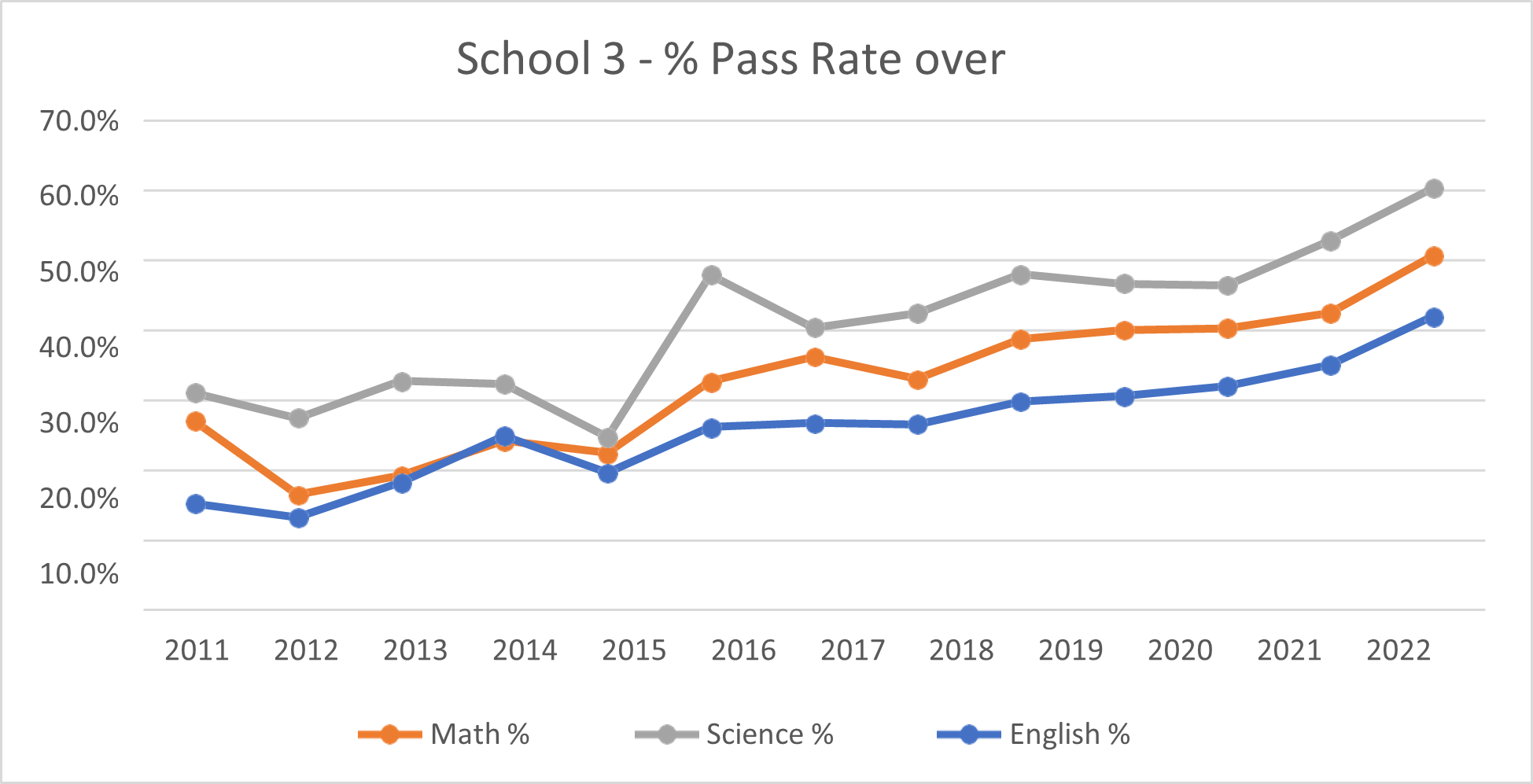
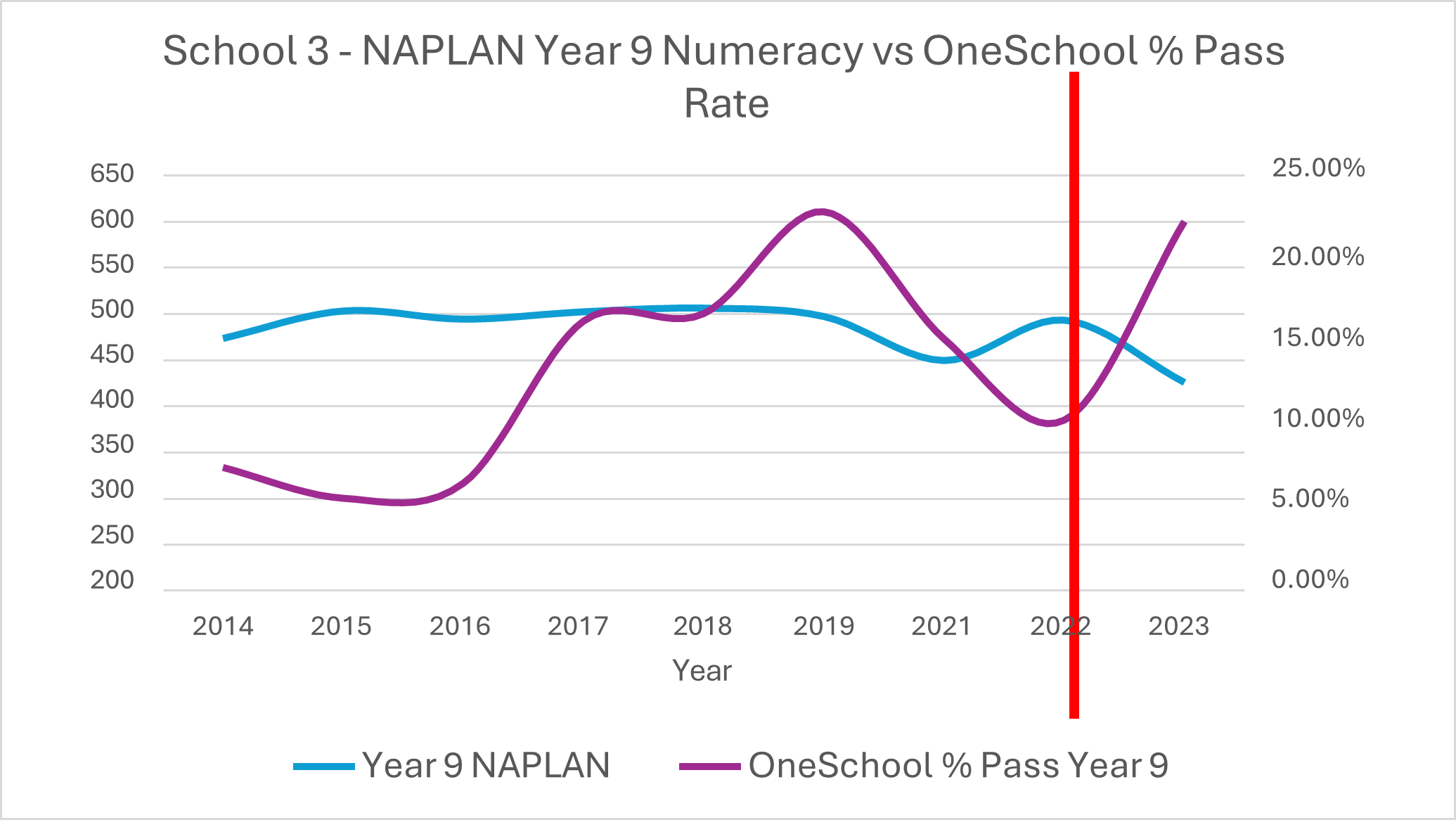
Fig. 1 – Pass Rate at School 3 and Fig. 2 – Pass Rate after adoption of our approach at Yarrabah in 2022
Digital Analytics Platform Development
WillowSoft Pty Ltd provided a uniquely tailored digital analytics platform that transformed how assessment data was collected, analysed and used. By coding every curriculum element and enabling electronic marking, the system offered detailed tracking of individual, class and cohort progress. Custom dashboards helped teachers quickly interpret learning patterns, identify breakdowns in understanding and make informed instructional decisions. As data accumulated, the platform’s analytical capabilities expanded, supporting deeper insights through class-wide trends and longitudinal tracking. Beyond the project’s conclusion, the platform continues to be used in partner schools, becoming a practical, embedded tool that informs teaching practice and supports ongoing curriculum planning.
One of our most important findings is that it offers hope that persistent gaps in STEM achievement can be addressed through focused attention to the core capabilities that enable all students to succeed.
Implications for Educational Practice
Our project demonstrates that substantive improvements in mathematics and science education are possible when interventions address the fundamental processes of teaching and learning through a systematic, evidence-based approach. The sustained nature of these improvements, their consistency across diverse school contexts and their translation into broader educational benefits suggest a robust and adaptable methodology with potential for wider application.
Most importantly, our findings offer hope that persistent gaps in STEM achievement can be addressed through focused attention to the core capabilities that enable all students to succeed.
This project was conducted through the ARC Centre of Excellence for Australian Biodiversity and Heritage (CE170100015).
Meet the Project Team
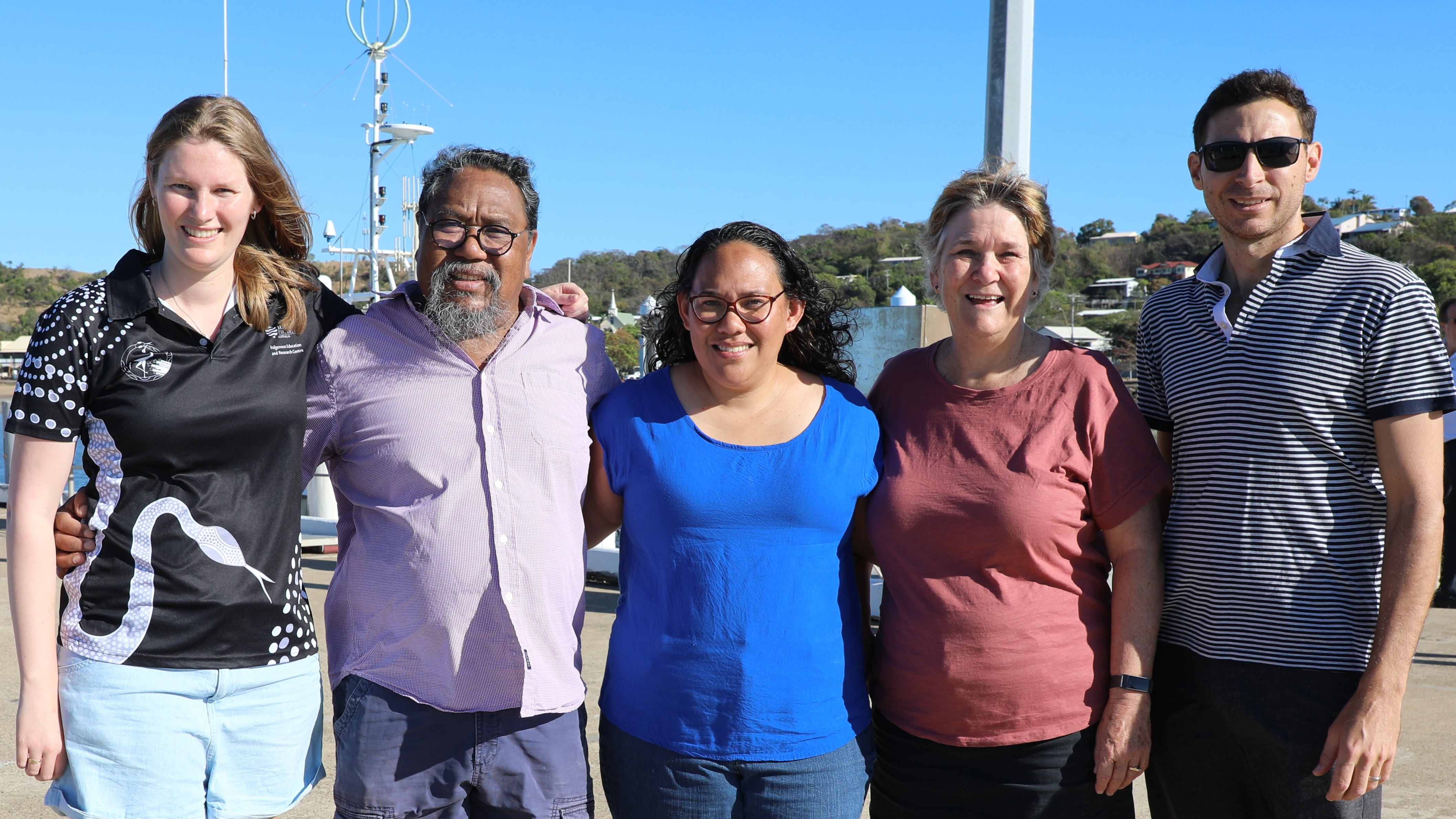
L-R: Danielle Vervenne, Professor Martin Nakata, Lisa Loban, Kerri Hill and Kevin Hemmett
Professor Martin Nakata
Chief Investigator
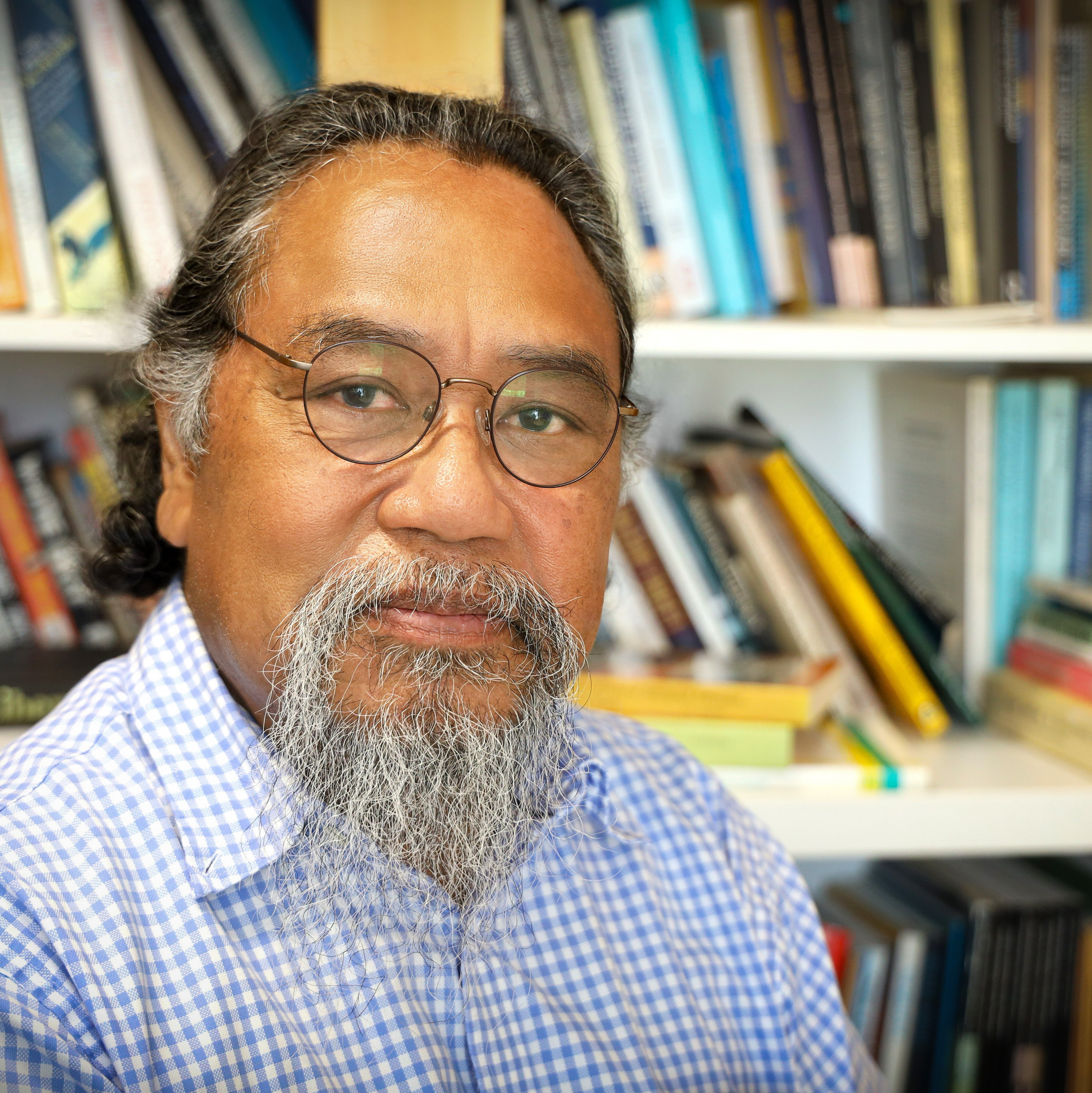
Chief Investigator Professor Martin Nakata AM, Pro Vice Chancellor (Indigenous Education & Strategy), Indigenous Education and Research Centre at James Cook University (JCU) leads the STEM Project.
Professor Nakata has worked in the field of Indigenous education in Australia for over thirty-six years and continues to challenge the established ways of understanding the contemporary position and possibilities for Indigenous Australians. His areas of focus have included higher education curriculum areas, the academic preparation of Indigenous students, and Indigenous knowledge systems. He is an internationally recognized published scholar for learning, teaching and research.
Professor Nakata has delivered invited keynote and plenary addresses at professional conferences in PNG, Malaysia, Taiwan, the Philippines, South Africa, Norway, Scotland, Greece, Iceland, Peru, New Zealand, United States, Canada, Thailand, Japan and throughout Australia.
Kerri Hill
Curriculum Development Officer
“Hard work beats natural talent when natural talent forgets to work hard”

With qualifications of a Bachelor of Science, a Diploma in Education and a Master of Science (Mathematics Education), Kerri’s experience plays an integral role to the team. Kerri has taught Mathematics in ACT, NT and QLD for over 40 years and was the Head of Faculty (Mathematics) at Townsville Grammar School for 23 years.
Kerri’s involvement in the team is to work collaboratively with the Mathematics staff at Tagai State College to write their Years 7-10 assessments and to provide feedback for the new QCE Year 11-12 assessments. With careful consideration of the Australian Curriculum content descriptors, Kerri ensures all required concepts are covered in assessments, giving students the exposure they need to study in Mathematics, Science and Engineering fields at university.
“These Tagai students deserve to have the same opportunities to reach their potential as every other Australian student” – Kerri Hill.
Danielle Vervenne
Curriculum Developer
“The more that you read, the more things you will know. The more that you learn, the more places you’ll go”

Hailing from Canberra, Dani moved to Townsville in 2013 to study at James Cook University – and to enjoy the sunshine. Since completing a Bachelor of Science (Environmental Management and Ecology Conservation), Dani has been involved in various aspects of the project including project support and filming, but is now heavily focused on curriculum development.
Dani’s role consists of the auditing, mapping and assessment development of Primary (Prep – Year 6) Maths, Science and Technology subjects, while working with the Tagai State College team to ensure their curriculum aligns with the Australian Curriculum achievement standards.
“The Tagai STEM Project is engaging students in the Torres Strait with the sciences, maths and technologies and broadening their skills for the future. The project aims to open up a whole new generation of professionals in the STEM areas” – Danielle Vervenne.
Jermaine Chong
Research Assistant
“If you knew better, you’d do better”
Originally from Mount Isa, Jermaine knows first-hand the challenges remote areas have on learning opportunities. His family moved to Townsville when Jermaine was young to expand his and his brother’s education prospects.
Since completing his schooling, Jermaine has worked as a Research Assistant at the University of Queensland and James Cook University, and has completed multiple internships with the Queensland Government’s Department of Science, Information Technology and Innovation.
While simultaneously undertaking a Bachelor of Arts at James Cook University, Jermaine’s involvement in the project includes media production and the research and delivery of activities within the STEM Roadshow, held on Thursday Island.
Jermaine hopes that one day, this project will be implemented in other remote schools across Queensland.
“Inspiring Aboriginal and Torres Strait Islander students to think big is where my passion lies. Whether it be through the media I create or being present in the classroom, I want to show our students that their futures can take them wherever they choose” – Jermaine Chong.
To make this project possible, the STEM Project Team have collaborated with a range of other contributors.
- Vicky Nakata – Primary mathematics and science curriculum and language advice
- Lisa Loban - Curriculum Developer
- Rikka Eastaughffe-Young - Curriculum Developer
- Adrian Jeloudev - Postgraduate Researcher
- Kevin Hemmett - Director, WillowSoft Pty Ltd
- Eric Schwantler - Director, WillowSoft Pty Ltd
- Dr Daniel Grainger – Audit and assessment development of Primary maths
- Dr Haidi Beard – Initial audit of science resources in the classroom
- Merwez Whaleboat – Preliminary science audit
- Lizzie Roche – STEM Roadshow development and implementation
- Jena Stephens – STEM Roadshow assistance
- Dr Leah Daniel – Secondary mathematics advice
- Associate Professor Shaun Belward – Secondary mathematics advice
- Kaylene Chippendale - Head of Department: Curriculum; Teaching and Learning
- Cherie Cefai – Curriculum Specialist; Teaching and Learning
- Toni Gorman – Head of Maths, Secondary
- Adrian Jeloudev – Head of Department Maths and Science
- Judy Ketchell – Executive Principal (retired 2019)
- Stephanie Savage – Executive Principal (current)
School Partnerships: The success of this project was built on strong collaborative relationships with school leadership teams and curriculum specialists at Tagai State College, Yarrabah State School, and Bentley Park College. While Tagai State College staff are listed above due to their involvement from the project's inception, the dedicated educators and leaders at all partner schools contributed their expertise, insights, and commitment to improving STEM outcomes for their students.
Contact Us
For more information on the STEM Project please contact: